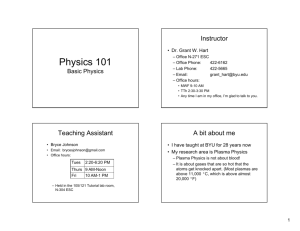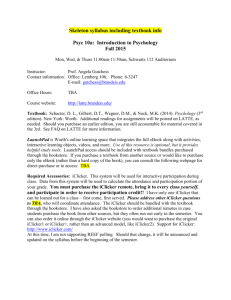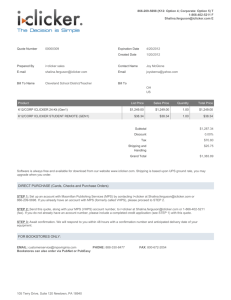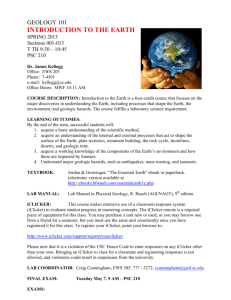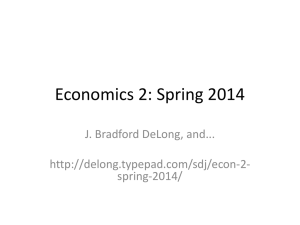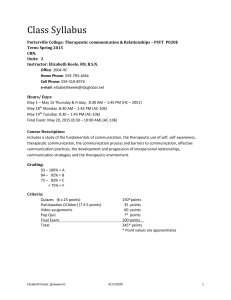1 Bi 1 Principles of Biology Spring 2014 COURSE INFORMATION
advertisement
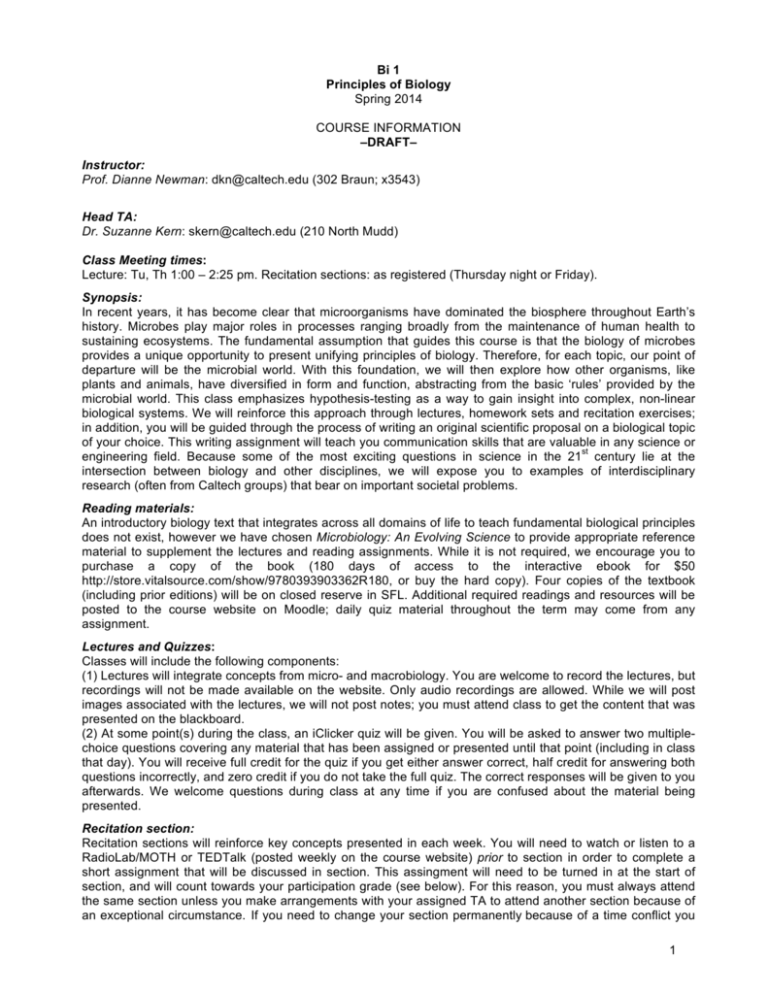
Bi 1 Principles of Biology Spring 2014 COURSE INFORMATION –DRAFT– Instructor: Prof. Dianne Newman: dkn@caltech.edu (302 Braun; x3543) Head TA: Dr. Suzanne Kern: skern@caltech.edu (210 North Mudd) Class Meeting times: Lecture: Tu, Th 1:00 – 2:25 pm. Recitation sections: as registered (Thursday night or Friday). Synopsis: In recent years, it has become clear that microorganisms have dominated the biosphere throughout Earth’s history. Microbes play major roles in processes ranging broadly from the maintenance of human health to sustaining ecosystems. The fundamental assumption that guides this course is that the biology of microbes provides a unique opportunity to present unifying principles of biology. Therefore, for each topic, our point of departure will be the microbial world. With this foundation, we will then explore how other organisms, like plants and animals, have diversified in form and function, abstracting from the basic ‘rules’ provided by the microbial world. This class emphasizes hypothesis-testing as a way to gain insight into complex, non-linear biological systems. We will reinforce this approach through lectures, homework sets and recitation exercises; in addition, you will be guided through the process of writing an original scientific proposal on a biological topic of your choice. This writing assignment will teach you communication skills that are valuable in any science or st engineering field. Because some of the most exciting questions in science in the 21 century lie at the intersection between biology and other disciplines, we will expose you to examples of interdisciplinary research (often from Caltech groups) that bear on important societal problems. Reading materials: An introductory biology text that integrates across all domains of life to teach fundamental biological principles does not exist, however we have chosen Microbiology: An Evolving Science to provide appropriate reference material to supplement the lectures and reading assignments. While it is not required, we encourage you to purchase a copy of the book (180 days of access to the interactive ebook for $50 http://store.vitalsource.com/show/9780393903362R180, or buy the hard copy). Four copies of the textbook (including prior editions) will be on closed reserve in SFL. Additional required readings and resources will be posted to the course website on Moodle; daily quiz material throughout the term may come from any assignment. Lectures and Quizzes: Classes will include the following components: (1) Lectures will integrate concepts from micro- and macrobiology. You are welcome to record the lectures, but recordings will not be made available on the website. Only audio recordings are allowed. While we will post images associated with the lectures, we will not post notes; you must attend class to get the content that was presented on the blackboard. (2) At some point(s) during the class, an iClicker quiz will be given. You will be asked to answer two multiplechoice questions covering any material that has been assigned or presented until that point (including in class that day). You will receive full credit for the quiz if you get either answer correct, half credit for answering both questions incorrectly, and zero credit if you do not take the full quiz. The correct responses will be given to you afterwards. We welcome questions during class at any time if you are confused about the material being presented. Recitation section: Recitation sections will reinforce key concepts presented in each week. You will need to watch or listen to a RadioLab/MOTH or TEDTalk (posted weekly on the course website) prior to section in order to complete a short assignment that will be discussed in section. This assingment will need to be turned in at the start of section, and will count towards your participation grade (see below). For this reason, you must always attend the same section unless you make arrangements with your assigned TA to attend another section because of an exceptional circumstance. If you need to change your section permanently because of a time conflict you 1 must contact the TA of your registered section and the head TA (Suzanne Kern). Permanent changes are not allowed after the first week. Section 1 is reserved for students with no prior biology background. Homework and writing assignments: Every other week you will be assigned a set of questions to help you master core concepts from the class. These homework sets must be turned in on Tuesdays at the beginning of class. See “late work” policy below. These sets will feature biological problems with an interdisciplinary or quantitative component. As the course progresses, homework assignments will also involve reading and analyzing primary research articles. The writing assignments will also be due at the beginning of class on Tuesdays. See “late work” policy below. Grading: This class may only be taken for a grade. • Writing Assignment (see separate guide): 30% • Lecture Quizzes (two questions per lecture, see above): 10% • We will drop your lowest score from your grade to allow for emergencies. • In-Class Midterm Exam (Thursday, May 1): 20% • In-Class Final Exam (Thursday, June 12): 25% • Homework and Section Participation: 15% • There will be 4 homework sets throughout the course. • Active participation in recitation will also be taken into account when assigning your grade. Honor code: We expect you to follow the Caltech honor code, which states that no member of the Caltech community shall take unfair advantage of another. Suspected violations will be promptly reported to the BoC. Course policies: • Attendance. We expect everyone to arrive on time and attend each lecture and recitation section. We may call on you to answer questions in class from time-to-time. • Electronic devices. You may use an electronic device (e.g., tablet) to take notes during class only if you use it for this purpose. Because keyboard typing can be a distraction to your neighbors, if you must use a computer, please sit in the front 2 rows of the lecture hall. Please turn off your cell phone for the entirety of the class out of respect for your classmates and instructors. If electronic usage is distracting for the lecturer or your classmates, you will be asked to leave. • iClickers. You will need to purchase an iClicker to participate in the lecture quizzes. You can purchase your iClicker online, either from the company directly (http://www1.iclicker.com/student-remote-iclicker-plus) or a separate retailer, such as amazon.com. Ask around; upperclassmen may be willing to sell you their iClicker if they no longer need it. If your iClicker malfunctions in class, you will be able to write your answers down on a piece of paper to turn-in to Suzanne Kern in class. You will need to register your iClicker online ASAP so you can use it in class on April 3. Go to http://www.iclicker.com/registration. Note that the remote ID number is found on the back of your iClicker beneath the barcode. Take care to complete the registration without typos. You must bring your iClicker to class on April 3 to complete the registration and use it for the first quiz. From this point forward, it will be your responsibility to bring the iClicker with you to every class. It is obviously an honor code violation to use another student’s iClicker in any way. • Collaboration. While you may discuss assignments with your classmates and TAs, you must write up your work yourself and in your own words. Preparation for sets and exams should be done in groups of no more than 5 people, where every member of the group contributes ideas. Quizzes and in-class exams will be taken on the honor code. For the writing assignment, you are encouraged to discuss ideas and seek feedback from your friends but you should not edit each other’s work. • Late work. Homework assignments will be posted online and are due at the beginning of class on alternate Tuesdays. The writing assignment components are detailed in a separate file, where due-dates can also be found. We will collect your assignments in a box on the front podium; this box will be shut at 1:05 pm and assignments will be considered late if they are not in the box at that time. • For work turned in between 1:05 pm and the end of class, you will lose 10% of your earned score • For work turned in after class but before 5 pm Thursday, you will lose 50% of your earned score • For work turned in after 5 pm on Thursday, no credit will be given. If you cannot complete your homework or writing assignment on time for a medical reason, you must have a note signed by a medical doctor (not a dean) to document this AND you will need to let Suzanne Kern know that it will be late before it is due. 2

